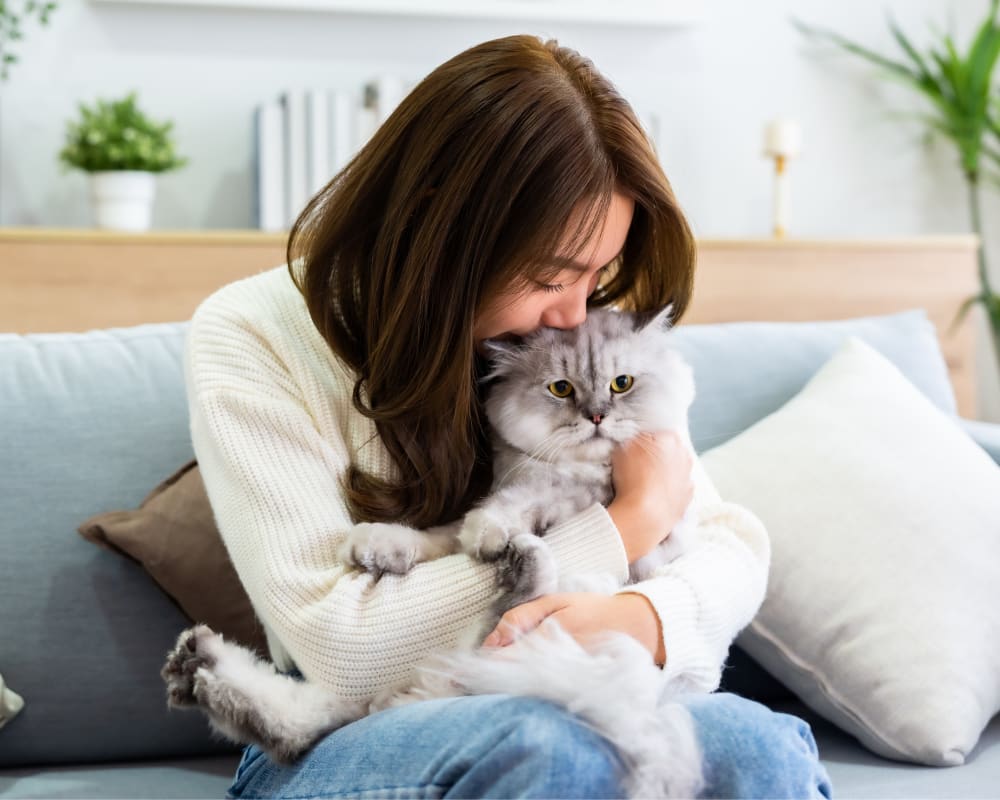Veterinary Care for Senior Cats
Veterinary Care Dedicated to Older Cats
As your cat gets older, they may need a little more help getting around, or you may notice that they are gaining a little too much weight even though you've fed them the same amount of food. This is why routine checkups from your veterinarian are key to ensuring a long and healthy life for your senior cat.
By attending regularly scheduled wellness exams, even if your cat seems healthy, our team can help your senior companion achieve and maintain optimal health. Identifying emerging health issues in the earliest stages allows treatment to begin when medical conditions are most easily managed.
Routine senior exams also allow your veterinarian to provide proactive care for age-related health problems, such as osteoarthritis and kidney disease, helping your senior cat maintain a good quality of life.

Health Problems in Senior Cats
Some of the conditions we frequently see in elderly cats are:
-
Joint or Bone Disorders
Osteoarthritis is a painful condition that can affect your senior cat's joints.
Symptoms of osteoarthritis in cats can be subtle. While cats can experience a decrease in range of motion, the most common symptoms of osteoarthritis in senior cats include weight loss, loss of appetite, depression, change in general attitude, poor grooming habits, urination or defecation outside the litter box and an inability to jump on and off objects.
-
Cancer
The unfortunate reality is that a large number of cats develop cancer in their lifetime, especially when they get older. Bringing your senior cat in for routine checkups, even when they seem healthy, allows your veterinarian to examine them for early signs of cancer. Earlier diagnosis typically results in better treatment outcomes.
-
Heart Disease
Senior cats can develop heart disease, so it is important for pet parents to know what to look for. Heart conditions, such as cardiomyopathy, heart murmurs, or congestive heart failure, can lead to symptoms like coughing, difficulty breathing, lethargy, and even sudden collapse.
-
Blindness & Hearing Loss
Older cats can experience varying degrees of deafness and blindness due to degeneration in the eyes and ears.
Blindness in cats can also be caused by other various factors, such as trauma or diseases affecting the eyes. Hearing loss in cats can also have multiple other causes, including congenital issues or infections.
It is important to note that these conditions often come on slowly, allowing pets to adjust their behaviour and making it difficult for pet owners to notice.
-
Liver Disease
Liver disease is common in elderly cats and may be the result of high blood pressure or hyperthyroidism. Symptoms of liver disease in cats include loss of appetite, jaundice, drooling, vomiting, diarrhea, and increased thirst. If your cat is displaying any of the symptoms of liver disease, veterinary care is essential.
-
Diabetes
Although cats can develop diabetes at any age, most are diagnosed in their senior years.
Symptoms of diabetes in cats include excessive thirst, increased appetite accompanied by weight loss, cloudy eyes, and chronic or recurring infections.
-
Kidney Disease
Kidney disease in cats is a condition where the kidneys are unable to properly filter waste products from the blood. This can result in a buildup of toxins and waste materials, leading to various health complications.
Symptoms may include increased thirst and urination, weight loss, decreased appetite, and vomiting. If left untreated, kidney disease can progress and cause severe damage to the kidneys, impacting a cat's overall health and quality of life.
-
Incontinence
Elderly pets can be prone to accidents as the muscles controlling the bladder begin to weaken. Incontinence can, however, be a sign of a bigger health issue such as a urinary tract infection or dementia, so it should never be dismissed as 'old age'.
Wellness Exams For Senior Cats
Regular exams for senior cats provide your veterinarian with the opportunity to detect developing medical conditions, such as cancer, diabetes, or heart disease, early so treatment can begin when the illness is most manageable.
At each checkup, your veterinarian will thoroughly examine your senior cat and ask about their diet and lifestyle. Diagnostic testing may be recommended to gain insight into your pet's health. Once we have your cat's results, we will recommend a treatment plan to address any existing health problems and help prevent potential age-related issues.
Vaccinations & Parasite Prevention For Senior Cats
A senior cat’s immune system may weaken with age, making them more susceptible to disease. Vaccinations help protect them against common, and potentially life-threatening illnesses, such as feline leukemia, rabies, and respiratory infections.
Parasite prevention is also crucial for senior cats. They may have a harder time fighting off infestations, which can lead to serious health issues like anemia or organ damage. Regular preventive measures, such as flea and tick medication and deworming, can help ensure their good health in their later years.
New Patients Welcome
The Cat Hospital of Kamloops is accepting new feline patients! If you are looking for a veterinarian who is solely committed to the unique needs of cats, get in touch today to book your first appointment.
